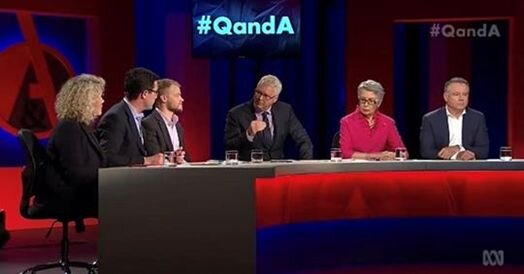3 Lessons I Learned From Being At a Live "Q and A"
I had the privilege of being in the live Q and A audience last Monday night.It was lively. It was fun. It was interesting (even though this particular Q and A was mostly about agriculture – important to my part of the world, but not really what I’m interested in). And I was reminded of 3 important truths that are increasingly fragile in our 2018 Australia:
1) Difficult Issues Are Best Tackled Outside Echo Chambers
We get clearer perspectives when we hear what others have to say
Before the show went live, the producer came out and said that Q and A is committed to having respectful debate between people of differing viewpoints. While some of my Christian and conservative friends might roll on the floor laughing to hear a Q and A producer say such a thing, I found the producer’s comments refreshing, even inspiring.In a world where ‘diversity’ is the new buzzword, I was encouraged to hear a Left-leaning program affirm one of the most important forms of diversity: viewpoint diversity. Yes, it’s nice to be diverse as far language, race, food, skin colour – and names. (They read out my name, as I had posted a tweet earlier – and yes, the producer mispronounced it – ‘Where’s Aye-kos Balof?’). But when discussing important issues, there is no more important diversity than diversity of thought and perspective.Why? Because we’re finite beings with blind-spots – both due to our lack of knowledge, and (because we're fallen) also due to our biases. So if we’re to tackle complex issues well, then we need to get out of our echo chambers. We need to hear other people’s perspectives. For they might see something we miss – or at least, their differing perspective sharpens our own as we debate with them.Sadly, this sort of open of public forum with open debate from various viewpoints is happening less and less. And it’s not just those with conservative leanings that are picking up on it. Writing from the secular Left, author Richard Flanagan bemoans this state (with particular reference to Australian Writer’s festivals):
And now, more than ever, we need places and forums where we can listen, reflect and discuss different perspectives and ideas that are not our own. This is not to suggest promoting propagandists and provocateurs to an equal footing with serious writers – but it is to argue that writing worthy of the name is not always comforting or reassuring, but that it does matter.
Flanagan continues:
The alternative is a Trumpian world of mindless Milo Yiannopoulos provocations on one side, and conformist clap trap on the other, both serving only to deliver power to those who would destroy us.'
Another Australian author, Christos Tsialkos (author of The Slap) put his 2c in the comments section of the same article:
I want to argue about ideas, I want to discuss them and I want to be challenged by them. I want to get scared by them. In solidarity, Christos Tsiolkas'
Yes, we need places where we can leave our echo chambers and hear ideas we disagree with. Where we can hear ideas that challenge us. And where all this happens without the threat of speech codes or censorship.
2) We need to hold Politician’s Feet to the Fire
Asking questions of our political leaders is a bulwark against authoritarianism.
The Lismore crowd was rowdy (I think Tony Jones used the term ‘lively’), which made me respect the politicians that decided to come on (in this case, Liberal Minister for Agriculture David Littlepround, and Shadow Minister for Agriculture Joel Fitzgibbon). It ain’t easy hauling yourself before a tough crowd!And yet, although audience members asked direct questions, to their credit the politicians did answer them (with the occasional prod by Tony Jones).Christian Theologian Oliver O’Donovan points to the importance of ‘candour’, about the public’s need to openly ask about and debate political issues. Such candour is a powerful force against tyranny, because it ‘discerns and articulates complex social and political truths in public’. I.e. we publicly discuss political and social issues, rather than simply accepting what politicians say.And at the very least, I saw such candour on display Monday night.And it was a good reminder why freedom of speech (that allows for such candour) is in everybody’s interest: it’s a bulwark against government tyranny.
3) It's Possible to Debate and Disagree Respectfully
Good public policy requires it.
While there was some loud booing and heckling when some unpopular views were spoken by the panellists, there were no riots that night. People said their piece, and the audience was able to hear everybody’s point of view.In other words, my Q and A experience showed me that it is possible to disagree with others respectfully (although, yes, some disagreement was less respectful than others!).And what’s more, we need to be able to disagree with others, without trying to silence or threaten them. For as former Deputy PM John Anderson argues:
You cannot get good public policy out of a bad public debate’.
Now, Q and A has been criticised for being one sided. But what I saw on Monday night was a discussion, a debate – and a good one at that.In a society that is getting ever more polarised, where we retreat to our echo chambers, Monday night gave me a glimmer of hope. Maybe it is possible for Australians of whatever persuasion to keep talking to one another – for the sake of our common future?
